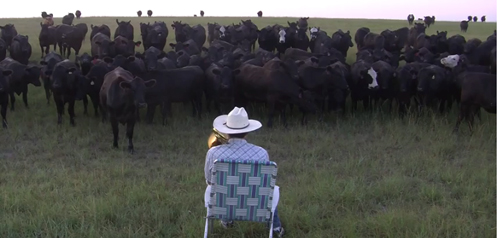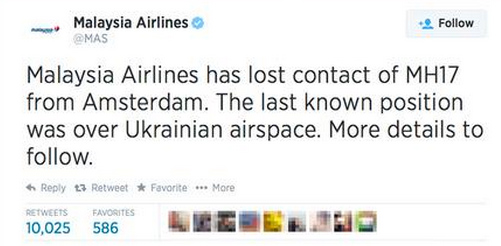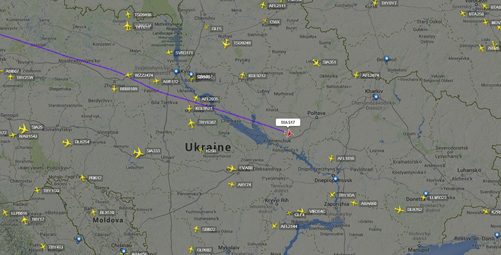
By Cynthia Herhert :: 8:17 PM
You’ve no doubt heard the song ‘Royals’ by New Zealand singer-songwriter Lorde, but have you heard it played on trombone?
Well, these cows have, and they come running from across the pasture just to listen to Kansas farmer Derek Klingenberg serenade them from a lawn chair.
In a video that Klingenberg posted to YouTube over the weekend, the farmer is seen taking his instrument out into the empty field, and he begins to play the first few bars of the pop song. Within a few seconds, you can already see the cows coming over the horizon, curious about the tune they hear.
Klingenberg, from Peabody, Kansas is no stranger to YouTube fame. His parody of ‘What Does the Fox Say?,’ entitled ‘What Does the Farmer Say?’ garnered more than 4 million views last year.
Want to hear what the cows came mooooving down the hill for? Take a listen below!

By Cynthia Herbert :: 1:38 AM
When you work at or attend an institution of higher learning in the United States, there are a few things you can expect. Overpriced food in the student union, perhaps. Red Solo cups scattered across frat house lawns early on a Saturday morning. Dishing out extra cash to use the campus Internet connection. Wait, what?
Yes, you read that last one right. Starting this academic year at the University of Texas at Austin, it looks like all faculty, staff and students will be required to pay for Internet usage on campus.
UT Austin Students will be required to purchase a usage plan if they want to log on to the Internet from the campus network. With the exception of some computer workstations in the libraries, “students must purchase a bandwidth plan to use university networks,” according to a change made to the school’s Public Internet Access guidelines.
The price for students to get online starts at $3 per semester. This gives students 10 GB of data transfer per week. Other plans are available, up to an $8 per semester plan that provides students with 500 GB per week of data access.
For non-students on campus, a category that includes faculty, staff, and official visitors, those groups will be given a weekly bandwidth allocation. If they run out of bandwidth during the week, their Internet connection speed will slow down considerably, and they will be shifted to what the University is calling a “second-class network.”
Faculty and staff are given the option to purchase additional bandwidth tiers if needed, to get themselves off of the slower second-class level of service. Upgrade prices aren’t disclosed without a UT Austin login, however. The base bandwidth allocations for faculty and staff are as follows: Faculty – 500 GB per week, Graduate Fellows and Full Time Staff – 50 GB per week, and Part Time Staff – 10 GB per week.
As can be expected, reactions to the new Internet usage fees were less than enthusiastic, with many students chiming in on Twitter in disbelief of the additional fees they would now be responsible for.
A sampling of reactions is below:
UT Austin’s new, stratified WiFi subscription service will relegate those low-income students unable to pay to a “second-class” network.
— Brianna (@beh_slop) July 30, 2014
I can’t believe 1 of the richest US schools requires students to communicate online, but is making us pay for internet. Petty. #UTAustin
— Cheepy (@shesists) July 31, 2014
@UTAustin Cannot believe that students and teachers will be charged for access to the internet. #petty #UTbandwidth
— Kate S (@kat_stev) July 30, 2014
@UTAustin: Screwing college kids out what little money they have one dumb idea at a time. #Internet #BigTicket
— Audrey Bounds (@audreybounds) July 30, 2014
BREAKING: @UTAustin makes it harder to access knowledge on internet by capping usage and charging for wifi. Will still subsidize football.
— Alex Branham (@JAlexBranham) July 30, 2014
ARE YOU KIDDING ME @UTAustin?! You’re now requiring me to PAY for internet access on campus?! Like you don’t devour my money enough.
— Audrey Bounds (@audreybounds) July 30, 2014
How does @UTAustin charge us for wifi!? Are you serious we have to pay for everything on this campus and now we can’t even get wifi free!?
— Swaggy K (@idealistic_KJ) July 31, 2014
I can’t believe that I have to pay for Wifi at UT Austin now. Tuition should cover that. The fact that it’s a separate charge is annoying
— Camille Langlinais (@Camillelang92) July 31, 2014
OK time to start my transfer application somewhere else because I have to pay for wifi? BYE @UTAustin #TAXI #IGottaGoSomewhereElse
— (@kenetteray) July 30, 2014
I say we cut football funds and put that towards wifi… now can wifi be free? @UTAustin
— X (@Britt_BaddFeet) July 30, 2014
$33k a year and the university can’t even afford to provide free WiFi anymore? #ripoff @UTAustin pic.twitter.com/MbYvU323IE
— Craig Hollis (@CraigRyanHollis) July 30, 2014

By Paul Thomson :: 11:39 AM
Reports are coming in via news wires and social media that a Malaysia Airlines passenger plane has crashed in the Ukraine. Unconfirmed reports say it is flight MH 17.
Among some of the reports are allegations that the plane was shot down by a missile over Russian territory. The flight had departed Amsterdam, and was halfway through its journey, due to land in Kuala Lumpur tomorrow morning.
An adviser to Ukraine’s interior minister, Anton Gerashenko, reported the plane was flying at an altitude of 33,000 feet when it was hit by a missile fired from a BUK launcher. The BUK missile system can fire missiles up to an altitude of 72,000 feet.
The eastern part of the Ukraine, where the plane was shot down, had seen intense fighting between Ukrainian forces and pro-Russia rebels earlier this week.
Pictures from the scene show a debris trail and smoke rising from the ground, and details are still being gathered.
Malasia Airlines is aware of the crash, but has not released a statement. A government official has said there were 280 passengers and 15 crewmembers, and that all died in the crash.
This story will be updated as news comes in.
Photo below from the crash scene:

Video from the crash scene:
Tweet confirming that the airline lost communications with the plane:

Flight radar data from just before MH17 disappeared from tracking:


By Cynthia Herbert :: 1:39 PM
If you’re one of the roughly 7 million households in the U.S. that has cut the cord from cable television over the past couple of years, you probably don’t miss it much. Except for watching live sports. And, if you’re a soccer fan, you’re probably missing that cable cord a whole lot right now.
While it is a bit difficult for non-pay television subscribers to get access to the latest matches from the World Cup in Brazil, it isn’t impossible, and just requires some patience and tolerance for languages other than English.
Although World Cup coverage in widely available across the rest of the globe, here in the United States, the broadcast rights are owned by Disney, as they were in 2010 as well. The company plans to show this year’s matches on ESPN (43 games), ESPN2 (11 games), and ABC (10 games). Without entering a password and authenticating from your pay television provider, watching the live streams via these network websites is not allowed.
However, if you can put up with Spanish speaking announcers instead of English speaking ones, then Univision network might just be your savior.  The Spanish-speaking network also has the Spanish-language broadcasting rights to the World Up games, and will be streaming all of the matches online, without requiring a pay-TV login.
Watching the games on Univision was a popular option during the 2010 matches, as the network had about twice as many viewers as ESPN did during the earlier games.
If watching the games on Univision isn’t your cup of tea, then you may want to consider using a VPN. With a VPN, you can often spoof your location to one that is outside of the US – like in Europe, South America, or Canada. With a different location, you will be more likely to bypass the filters on foreign content websites, and be allowed to watch some of the matches for free. Popular VPN sites include Hola and UnoTelly.
With a little perseverance, cord cutters too will be shouting “GOOOAL” in real time as their teams advance in the matches.




